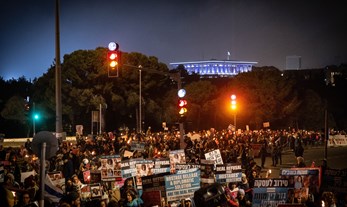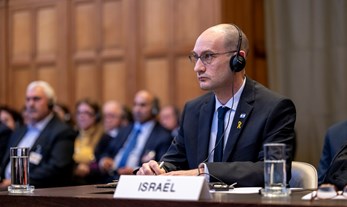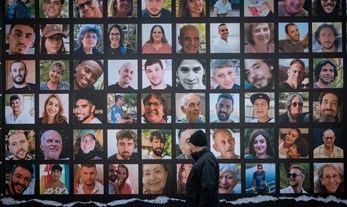


JFNA & IDI Webinar on Israel’s Economy with Prof. Karnit Flug and Bloomberg News’ Galit Altstein
IDI's Prof. Karnit Flug, VP of Research and the William Davidson Senior Fellow for Economic Policy joined Jeff Schoenfeld, Chair of the Jewish Federation's Israel and Overseas Committee and Bloomberg's Galit Altstein to discuss the implications of the ongoing war in Gaza on Israel's economy.

Majority of Israelis give low ratings to Prime Minister Netanyahu; high ratings to IDF Chief of Staff
Written By: Prof. Tamar Hermann, Yaron Kaplan, Dr. Lior Yohanani
The majority of Israelis gave Prime Minister Netanyahu low ratings (57%), while IDF Chief of Staff Herzi Halevi topped the rankings of positive performance (48%). More than two-thirds of Israelis think we are on the verge of an all-out-war with Hezbollah – 69%.

Large Majority of Jewish Israelis Want Changes to the Conscription Law
Written By: Prof. Tamar Hermann, Yaron Kaplan
Most Israelis would like to see the exemption given to the Haredi community changed; when asked whether the Israel can continue relying on the US's support, public opinion was divided, with an inclination toward continued reliance; around half of Israelis think Israel's standing in the international arena is not good.

Most Israelis: an "Absolute Victory" to the War is Unlikely
Written By: Prof. Tamar Hermann, Yaron Kaplan
Most Israelis think Palestinian terrorism will remain the same or increase if a Palestinian state were declared. A vast majority (81%) of Israelis think the likelihood of reform in the Palestinian Authority is low, while a majority of Israelis think absolute victory in Gaza is unlikely.

A Large Majority of Israelis Want Early Elections
Written By: Prof. Tamar Hermann, Dr. Or Anabi
59% of Jewish Israelis oppose a deal that would lead to the establishment of a Palestinian state with guarantees from the US and peace agreements with Arab states such as Saudi Arabia; when asked to choose, 51% of Israelis said they think the main goal of the war should be bringing the hostages home and 36% think it should be toppling Hamas; half of Israelis think the ICJ ruling, issuing temporary measures, to be harsh.

Most Israelis Oppose a Hostage Deal in Exchange for a Halt in Fighting and Releasing all Palestinian Prisoners
Written By: Prof. Tamar Hermann, Dr. Or Anabi
Most Jewish Israelis expect the war to continue for months, while a majority of Jewish respondents oppose a deal for the release of the hostages in return for the release of all Palestinian prisoners and a cessation of the fighting in Gaza. Meanwhile, over 60% of Israelis claim that their personal lives have returned to normal.

What Is International Law and is Israel Obliged to Abide By It?
IDI's Prof. Amichai Cohen answers a series of questions on international law and its dealings with the laws of war.

What Does International Law Have to Say Regarding War?
IDI's Prof. Amichai Cohen answers a series of questions on international law and its dealings with the laws of war.

What Are the "Laws of Armed Conflict" And Who Is a Legitimate Target?
IDI's Prof. Amichai Cohen answers a series of questions on international law and its dealings with the laws of war.

What Does Proportionality in War Mean?
IDI's Prof. Amichai Cohen answers a series of questions on international law and its dealings with the laws of war.

Is Israel Doing Enough to Abide by International Law?
IDI's Prof. Amichai Cohen answers a series of questions on international law and its dealings with the laws of war.

International Law and the War in Gaza
Written By: Prof. Amichai Cohen
IDI's Prof. Amichai Cohen answers a series of questions on international law and its dealings with the laws of war.

Most Israelis Oppose Meeting US Demands to Shift to New Phase of War
Written By: Prof. Tamar Hermann, Dr. Or Anabi
About two-thirds (66%) of Israelis say they do not think Israel should agree to US demands to shift to a phase of the war with a reduced heavy bombing in populous areas. 75% of Jewish Israelis oppose meeting the demands, compared to only 21% of Arab Israelis.

Even on the Right, Israelis Want Elections Immediately After the War
Written By: Prof. Tamar Hermann, Dr. Or Anabi
Two thirds of Israelis do not think that the government currently has a clear plan of action for the next day and the majority, even on the right, believe elections should be held as soon as the war ends. Even so, no significant movement is currently indicated between the political blocs.

Israelis Sharply Divided on the Question of a Two-State Solution in Return for US Assistance
Written By: Prof. Tamar Hermann, Dr. Or Anabi
Among Jewish Israelis, 75% on the Left support making progress toward a two-state solution to the conflict in return for American assistance, compared to 45% in the Center and only 21% on the Right.

Yohanan Plesner on Fox News | "It's the cause of Freedom"
Yohanan Plesner, president of IDI, spoke with BBC News' Ben Brown as wide-scale protests erupted in Israel following the harrowing murder of six Israeli hostages by

Yohanan Plesner, President of IDI on PBS | The War with Hamas
Yohanan Plesner, President of IDI on PBS Newshour: "In 2014, there was an attempt by Hamas to launch the exact same thing... just that time, they failed."

Overwhelming Majority of Jewish and Arab Israelis: The Release of all Hostages is a Goal of Importance
Written By: Prof. Tamar Hermann, Dr. Or Anabi
IDI's fifth War in Gaza survey finds that among Jewish Israelis, toppling Hamas and releasing the hostages are pivotal war-goals. The majority of respondents do not think that the government currently has a clear action for the day after the fighting ends, and there is rising support (56%) for an amendment to the Nation-State Law, to safeguard equality for non-Jewish citizens.

Most Israelis Prefer to Wait Until After the War to Designate Responsibility
Written By: Prof. Tamar Hermann, Dr. Or Anabi
The October 2023 edition of the Israeli Voice Index shows that a significant majority of Jewish Israelis trust the heads of the IDF over PM Netanyahu. If elections were to be held today, a majority of Israelis (55%) would vote for the same bloc they voted for in the last elections.

30 years after the Oslo Accords: A large share of Israelis think it was wrong for Israel to enter the process
Written By: Prof. Tamar Hermann, Dr. Or Anabi
As we mark the 30th anniversary of the Oslo Accords this month, a larger share of Jewish respondents think it was incorrect to enter into that process, while the percentage of respondents who selected "don't know" was exceptionally large.

Many Israelis believe a deal with Saudi Arabia would strengthen PM Netanyahu politically
Written By: Prof. Tamar Hermann, Dr. Or Anabi
As it is widely known that negotiations have been underway between Israel and Saudi Arabia under the auspices of the United States, we asked two questions regarding the expected impact of the negotiations and a possible agreement on domestic matters.

Following the Supreme Court Reasonableness Hearing: Where are we Now?
Yohanan Plesner, president of IDI and Prof. Yuval Shany, a Senior Fellow at the Center for Democratic Values and Institutions met with reporters to discuss the historic Supreme Court hearing on the repeal of the reasonableness doctrine.

Israelis are deeply divided on the upcoming Supreme Court hearings
Written By: Prof. Tamar Hermann, Dr. Or Anabi
41.5% of coalition voters and 6% of opposition voters said that the Court lacks the authority to perform judicial review over Basic Laws passed by Knesset. 73% of Israelis agree that in order to bridge the divisions between the political camps, attempts should be made to reach a compromise.

Education and Democracy
Dr. Tammy Hoffman, Director of IDI's Education Policy Program explains why the current political and social crisis in Israel is related to the education system and why there cannot be democracy without educating toward democracy.

In Anticipation of the Knesset’s Vote on the “Reasonableness Standard” – What Happens Next?
With the Knesset set to hold its final vote on curtailing the “reasonableness standard,” what happens next? What are the implications of removing this type of oversight on governmental decisions, and is there still a possibility for compromise ahead of the vote?






